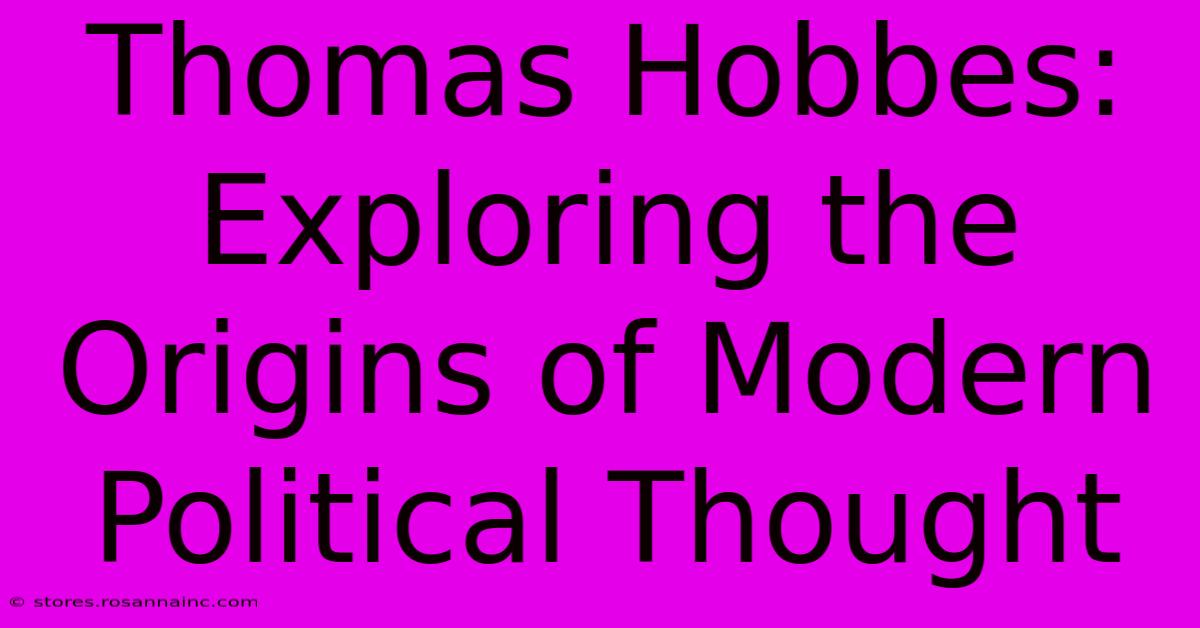Thomas Hobbes: Exploring The Origins Of Modern Political Thought

Table of Contents
Thomas Hobbes: Exploring the Origins of Modern Political Thought
Thomas Hobbes (1588-1679), a pivotal figure in Western philosophy, profoundly shaped modern political thought. His masterpiece, Leviathan (1651), offered a stark vision of human nature and the social contract, influencing subsequent political theorists and continuing to spark debate today. This article delves into Hobbes's life, key ideas, and lasting legacy, exploring his contribution to the foundations of modern political philosophy.
Hobbes's Life and Context
Born during a time of significant political upheaval in England – encompassing the English Civil War – Hobbes witnessed firsthand the devastating consequences of societal breakdown. This tumultuous backdrop heavily influenced his philosophical outlook, shaping his pessimistic view of human nature and his advocacy for a strong, centralized state. His education, encompassing classics, mathematics, and philosophy, provided him with a robust intellectual foundation. He served as tutor to the Cavendish family, gaining access to elite circles and engaging in intellectual exchanges that further honed his philosophical development.
The Leviathan: A Foundation of Political Philosophy
Leviathan is not just a political treatise; it's a comprehensive philosophical system addressing human nature, society, and the state. At its core lies Hobbes's concept of the state of nature. He argued that without a governing power, humanity exists in a brutal "war of all against all," where life is "solitary, poor, nasty, brutish, and short." This state, driven by individual self-preservation and a relentless pursuit of power, is characterized by constant fear and the absence of morality or justice.
Key Concepts within Leviathan:
- Social Contract Theory: To escape this horrific state of nature, individuals enter into a social contract, surrendering certain rights to an absolute sovereign in exchange for security and order. This sovereign, whether a monarch or an assembly, holds supreme authority, maintaining peace through the threat of punishment.
- Natural Law: Despite his pessimistic view of human nature, Hobbes acknowledges a form of natural law. This law, dictated by reason, dictates self-preservation as the primary human drive. The social contract, therefore, arises from the rational pursuit of self-interest, ultimately benefiting individuals by providing a stable and secure environment.
- Sovereignty: The sovereign's power is absolute and indivisible. Hobbes argued that any division of power would lead to conflict and the potential collapse of the social order. The sovereign's authority is crucial for enforcing laws, maintaining order, and preventing the descent back into the state of nature.
Lasting Influence and Criticisms
Hobbes's ideas have had a profound and enduring impact on political philosophy. His social contract theory, although debated extensively, remains a cornerstone of modern political thought, influencing thinkers like John Locke and Jean-Jacques Rousseau. His emphasis on the importance of a strong state continues to resonate in discussions about security, law, and governance.
However, Hobbes's work has also faced substantial criticism. Critics argue that his pessimistic view of human nature is overly simplistic and fails to account for the capacity for cooperation and altruism. Furthermore, his advocacy for absolute sovereignty raises concerns about individual liberty and the potential for tyranny. The lack of mechanisms for checks and balances within his proposed system is a significant point of contention.
Conclusion: A Legacy of Debate
Thomas Hobbes's Leviathan remains a seminal text in political philosophy, provoking discussion and debate centuries after its publication. His insights into human nature, the social contract, and the necessity of a strong state continue to shape our understanding of politics and society. While his ideas have been both celebrated and critiqued, his contributions to the development of modern political thought are undeniable and continue to be relevant in navigating the complexities of the modern world. His work serves as a powerful reminder of the ongoing tension between individual liberty and the need for social order, a tension that continues to define the political landscape today.

Thank you for visiting our website wich cover about Thomas Hobbes: Exploring The Origins Of Modern Political Thought. We hope the information provided has been useful to you. Feel free to contact us if you have any questions or need further assistance. See you next time and dont miss to bookmark.
Featured Posts
-
Legal Prostitution In Las Vegas Your Questions Answered
Feb 10, 2025
-
Lee Majors Bionic Earnings And Real Life Riches
Feb 10, 2025
-
Own A Piece Of History The Come And Take It Flag
Feb 10, 2025
-
Al Capones Laundering This Book Isnt What You Think
Feb 10, 2025
-
Secrets Of The New York Times Building Unveiled
Feb 10, 2025
